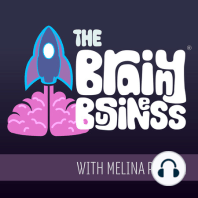53 min listen

79. Why Our Brains Love Nostalgia & Traditions (And How To Incorporate Them Into Your Business Strategy)
FromThe Brainy Business | Understanding the Psychology of Why People Buy | Behavioral Economics
79. Why Our Brains Love Nostalgia & Traditions (And How To Incorporate Them Into Your Business Strategy)
FromThe Brainy Business | Understanding the Psychology of Why People Buy | Behavioral Economics
ratings:
Length:
27 minutes
Released:
Dec 20, 2019
Format:
Podcast episode
Description
Holidays are a time filled with traditions and reflecting upon the past, remembering the good ol’ days or reliving your childhood…while creating new memories with (and for) those around you. This episode is all about nostalgia and traditions, and it fits in perfectly with the holiday theme. As we dive into the topic of nostalgia, I’ll explain nostalgia’s Swiss origins in the 1680s and the root of the concept. I talk about how it’s not negative or pain inducing, but it can be triggered by a sad or tragic event. There are a lot of benefits of nostalgia and thinking about the good ol’ days. It can help increase self-esteem, feelings of belonging, growth on a psychological level, and even make people act more charitably. It can also be a powerful technique for marketing and advertising. People are most likely to become nostalgic at major transitions in life. This is why a midlife crisis is a time where people buy the car they always wanted when they were in high school, or go back to visit their childhood home. Marketing or advertising for these sorts of things at the right time can trigger nostalgia and action in a buyer of a certain age. I’ll be talking about all that and why our brains love nostalgia and tradition while also giving a few tips about how to use this in your business – whether it’s at the holidays or any other time of year. Show Notes: [02:22] The concept of nostalgia was first introduced in the 1680s. Being far from home caused Swiss soldiers to have all kinds of symptoms. [02:40] The root is from the concepts of “return home” and “pain.” [02:55] Everyone can feel nostalgia, and it's not negative in and of itself. [03:11] A sad event may cause us to think about the good old days. There are actually many benefits of nostalgia. It can help increase self-esteem, and feelings of belonging, and encourage psychological growth. It even helps us to remember that our lives can have meaning and value. [03:44] It's also a powerful technique for advertising and marketing. [04:00] Our bodies are made up of constantly changing atoms. Our makeups change every five years. [05:23] Sometimes what feels like a tradition is actually an assumption from the observer. [05:49] Ask a question. If you've always done something a certain way ask why. (Even if it doesn’t appear broken...ask.) [06:09] Nostalgia helps us remember our lives have meaning and value. Most of our best memories are from the ages of 10 to 30. This span is called the reminiscence bump. [06:26] This period of time is important, because it's heavily linked to the time that we form a sense of ourselves. [08:45] Children are quite sensitive to effort, and with good reason. Actions speak louder than words. [09:17] Children can differentiate between fantasy and history, evaluate the strength of evidence and prefer claims with scientific framing. Children in many cultures are less likely than adults to appeal to supernatural explanations for unlikely events. [10:09] Feelings of nostalgia are most likely to come up whenever you feel sad or lonely. Nostalgia – remembering important people in your life or key moments – can help you to feel better about yourself. [10:51] People are also most likely to become nostalgic at major transitions in life. This is why a midlife crisis is a time where people buy the car they always wanted when they were in high school, or go back to visit their childhood home. Marketing or advertising for these sorts of things at the right time can trigger nostalgia and action in a buyer of a certain age. [11:16] Finding a trigger that can make someone feel nostalgic can make them feel better and more endeared toward your product. Incorporating all of the senses is also important. [13:03] Studies have shown nostalgia physically warms you up! [13:21] Our brains are also wired to make memories much better than they actually were. Our nostalgic brains build memories up to be better than anything that could possibly be. [14:33] Our brains are nostalgic an
Released:
Dec 20, 2019
Format:
Podcast episode
Titles in the series (100)
11. Anchoring & Adjustment: The 1 Word That Increased Sales 38%: Today’s behavioral economics podcast is another foundational episode focusing on anchoring and adjustment. My last foundational episode was and even though it has only been out about a week, it has been one of my most popular episodes to date. You... by The Brainy Business | Understanding the Psychology of Why People Buy | Behavioral Economics